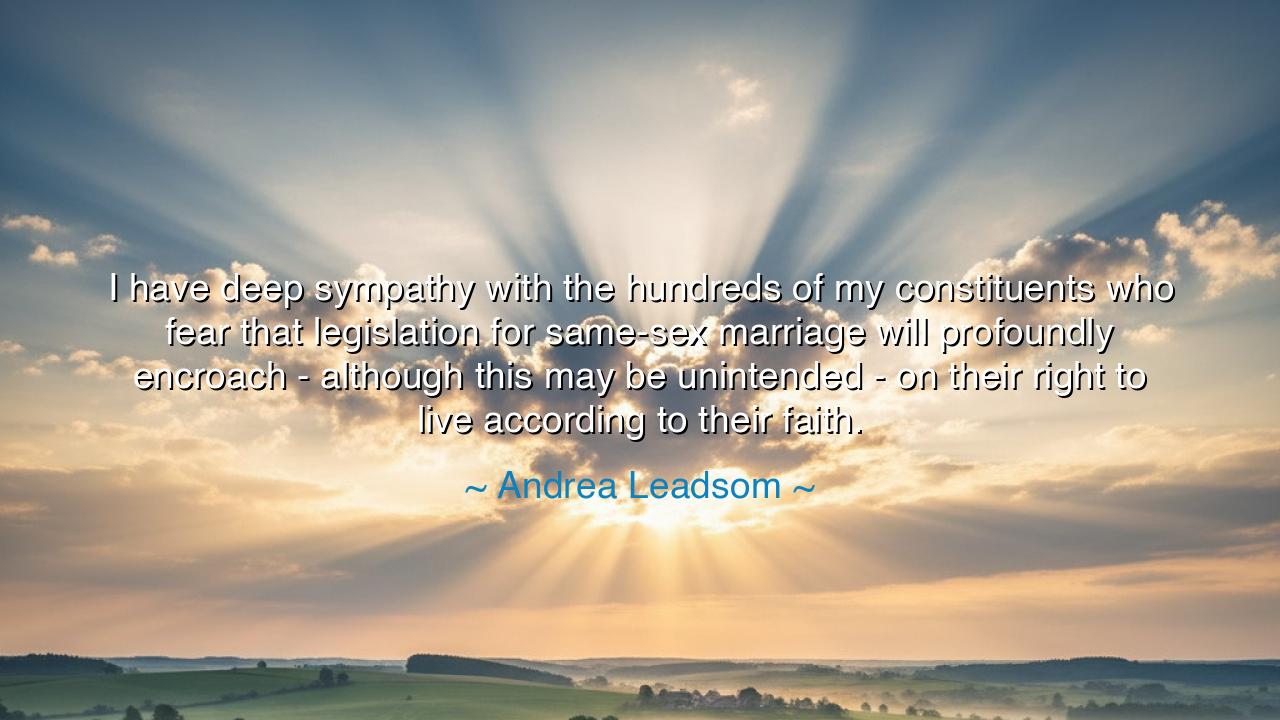
I have deep sympathy with the hundreds of my constituents who
I have deep sympathy with the hundreds of my constituents who fear that legislation for same-sex marriage will profoundly encroach - although this may be unintended - on their right to live according to their faith.






In the vast fabric of human existence, the tension between faith and law has been woven throughout history, with each era grappling to strike a balance between personal beliefs and the collective responsibilities of society. Andrea Leadsom’s words, "I have deep sympathy with the hundreds of my constituents who fear that legislation for same-sex marriage will profoundly encroach—although this may be unintended—on their right to live according to their faith," offer a poignant reflection on the delicate relationship between individual rights and societal changes. This statement encapsulates the timeless struggle of those who feel their deeply held beliefs are at odds with the evolving moral and legal landscape of the world.
In the ancient world, faith and law were often seen as inseparable. The laws of ancient societies were often built upon religious foundations, with rulers seen as divinely ordained to uphold the will of the gods. Consider the Code of Hammurabi, one of the earliest and most complete written legal codes, which was believed to be divinely inspired. In such societies, the conflict between the divine right of rulers and the faith of the people was often resolved by aligning religious teachings with governance. However, as societies evolved, especially in the Western world, the division between church and state became a central theme in the development of modern democracies. Yet, the essence of faith, the deeply personal connection to one’s beliefs, remains at the heart of many debates about societal progress.
The statement by Leadsom also reminds us of the moral and emotional challenges faced by those who see changes in the law as an affront to their religious values. The passage of laws permitting same-sex marriage is seen by many as a monumental step in human rights, a reflection of equality and justice. Yet, for others, particularly those whose faith condemns such unions, the change represents a profound moral dilemma. This tension between progress and faith is not a new phenomenon. In ancient Rome, for example, the spread of Christianity was seen by many as a challenge to the traditional religious practices of the Roman Empire. Early Christians faced persecution for refusing to worship the gods of Rome, believing that their faith was a higher calling than the laws of the land. In a similar vein, today, many view the acceptance of same-sex marriage as a challenge to their own understanding of morality and divine will.
Yet, history has shown us that such tensions are not without resolution. King Constantine, the first Roman emperor to embrace Christianity, found himself navigating the delicate balance between pagan traditions and the new Christian faith. His reign marked a turning point, not only for the Roman Empire but for the entire world, as he legalized Christianity and thus began the long process of blending faith and empire. Constantine’s decision, however, was not without conflict—just as Leadsom’s constituents wrestle with their own struggle between faith and law. This moment in history teaches us that change in societal norms can be uncomfortable, but it also demonstrates that dialogue, understanding, and time can lead to the peaceful coexistence of seemingly opposing forces.
The lesson embedded in Leadsom’s words is a call for compassion and understanding in the face of societal change. For those who fear that their right to live according to their faith is being encroached upon, it is essential to engage in respectful dialogue, recognizing the legitimate concerns on both sides. While progress must continue to push forward, it must be done in a way that respects the deeply held beliefs of all individuals. Just as the ancient philosophers, such as Socrates, believed in the value of conversation and seeking wisdom through understanding, so too should we approach these debates with a spirit of empathy and mutual respect. It is only through this lens that we can hope to find a path forward that balances both individual rights and societal progress.
In our own time, the key action we can take is to approach these challenges not with fear or anger, but with a deep sense of understanding and compassion. Just as the great civilizations of the past struggled with the tension between the personal and the collective, so too must we engage in thoughtful conversations about how best to honor faith while promoting the rights and freedoms of all individuals. This process requires not just legal reform, but a shift in hearts and minds, a willingness to listen and to grow. For it is only through this dialogue, this bridging of perspectives, that we can hope to build a society where both faith and progress can coexist harmoniously, allowing all to live with dignity and respect.






AAdministratorAdministrator
Welcome, honored guests. Please leave a comment, we will respond soon